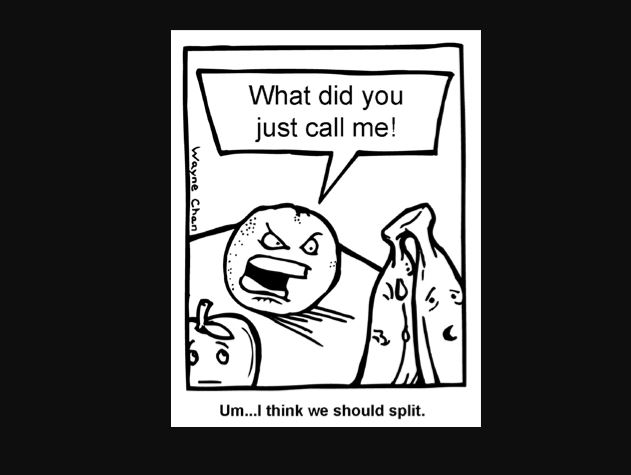By Wayne Chan, AsAmNews Humorist
I have a simple linguistics test for you.
The next time you go out for breakfast, I’d like you to try and order a glass of orange juice as quickly as possible. Simple, right?
Oh, I forgot one important part of the test. Try ordering said glass of juice without anyone using the word, “orange”. Aha…not so easy now, huh smarty pants?
Inevitably, the conversation between you and the server will go something like this:
You: And with my breakfast, I’d like to order a small glass
of…uhh…
Server: Yes?
You: I’d like a glass of juice from a certain type of fruit. Server: Of course, no problem. What type of juice would you
like?
You: Uhh…well, it’s a citrus fruit, but not a lemon or a lime.
It’s round like a grapefruit but not a grapefruit.
Server: Hmm…I see. Maybe I can help. What color is the fruit
you’d like juice from?
You: Color, yes, of course. Well, uh…it’s like a darker yellow,
or maybe a lighter brown color.
Server: I’m sorry, but could you be a bit more specific?
You: I don’t suppose you have any tangerine juice?
I bring this up because in the miracle of communication that we call language, a single word like “orange” can make the biggest difference in the world. Unfortunately, I found this out the hard way on my last trip to China.
As I said, a word like “orange” is pretty invaluable when you want to order a simple glass of orange juice.
The same is true in China, where prior to Covid, I’d go regularly for business.
While the primary Chinese dialect, Mandarin, is basically the same wherever you might speak it throughout the world, there are a few words spoken in China that are not really used by Chinese speakers anywhere else in the world.
Let me give you a couple of examples.
Anywhere else outside of China, when you refer to a waitress in a Chinese restaurant, you address her using the Chinese words, “Xiao Jie”, which basically means “young lady.”
However, in certain parts of China, I learned the hard way that you do not refer to a waitress in China with the term “Xiao Jie”, because culturally, that term is usually reserved when you are addressing a um…well…a “lady of
the night”. Or how about a woman working in the oldest profession? I’m sure you know what I mean.
You might also be interested to know that the Chinese phrase for orange juice anywhere outside of China is “Ju-zi shwei”, which literally means “orange water”. However, ordering orange juice in China by using the phrase “Ju-zi shwei” will give you a blank stare from your server, because the phrase will sound like gibberish, as if you took the phrase “orange juice” and replaced it with a nonsensical word like, say, “putty-moo”, because their word for orange juice is “chen jr”, which is a word I had never heard.
I wish someone had told me this just a little bit sooner.
That’s right, you guessed it. During my last breakfast in China, I nonchalantly flagged down my waitress, smiled, and proceeded to loudly and confidently blurt out the following request, in Chinese:
“Good morning prostitute! When you get a chance I would really like you to give me some putty-moo.”
You’d be surprised at how many government officials eat at that particular restaurant.
AsAmNews has Asian America in its heart. We’re an all-volunteer effort of dedicated staff and interns. Check out our new Instagram account. Go to our Twitter feed and Facebook page for more content. Please consider interning, joining our staff, or submitting a story, or making a contribution.


